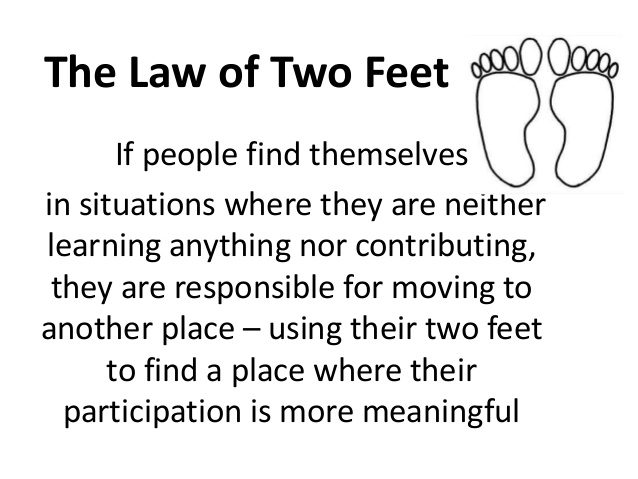Open Space Technology is a product of Harrison Owen’s observations at conferences and meetings in the mid-1980s that people tended to use coffee breaks for deeper and more effective discussion and learning than the formal presentations and plenary sessions. The result of his thought process was the Open Space Conference.
Open Space conferences are based on trusting in the productive self-organisation of groups within a comfortable, inspiring and intellectually unburdened “space”. There are no keynote speakers, no set agendas, no moderated panels of guest experts, no strict cleft between the facilitators, speakers, learners and organisers. In the face of this lack of “conventional convention form”, given the responsibility to take on responsibility for all the roles mentioned above, the situation can become quite awe-inspiring – for learners and experts used to lecturing at conferences alike. Everyone sits in a huge circle – without tables – in one row and learn in the first hour that this is their conference, that they are responsible for the “right” agenda, content, way of discussing and also for their satisfaction with the conference’s benefits. This is a much different attitude to learning, discussing and coming to results than the participant of a conventional meeting knows. Any participant who leaves the conference saying, “Well, they didn’t even address X or discuss the implications of Y” has only one “organiser” or “expert” to blame – him or herself.
Click here to view a video that explains open space technology.
There is often an initial uncomfortable space of silence after the welcome address and invitation to the learners to share their issues and topics for later discussion with the entire room. One person always starts though and makes his or her way to the centre of the room, writes a discussion theme or activity down on a large sheet of paper in big letters and then announces it per microphone to the group. After selecting one of the many pre-established times and places in the empty agenda poster, they post their proposed workshop. When everyone who wants to have announced and posted their initial offerings – many taking place simultaneously, all learners are invited to come to the “marketplace", where they put together their personal schedules for the remainder of the conference. The meetings and discussions begin immediately and go on for two of the three days’ conference. The third day is spent reading the results of the meetings, prioritising the major points of interest and implementation and allocating responsibilities.
The Open Space Principles ensure that the apparent chaos of the conference – “Does anyone know where the discussion on X is taking place?” – becomes a self-driven and motivated, productive meeting place for the issues and topics important to the learners. Raised to the status of experts as well as learners, they will not only take on more responsibility for their contributions during the conference but will also be more likely to roll out the results and – through ownership – implement them.
Although a principle of all participatory processes and interventions, it is even more important at an Open Space Conference that every participant is passionate about the topic and willing to follow up on the results.
Four key principles:
- Whoever comes are the right people.
- Whatever happens is the only thing that could have happened.
- Whenever it starts is the right time.
- When it is over it is over.
The Law of Two Feet

A further Open Space principle is The Law of Two Feet: "If you find yourself in a situation where you aren't learning or contributing, go somewhere else." This law causes some learners to flit from activity to activity. These are known as bumblebees because they cross-pollinate all the workshops. Some learners will decide to leave the dialogue and sit by themselves. They are known as butterflies, creating quiet centres of thought or apparently informal conversations, some of which will turn out to be relevant for other meetings.